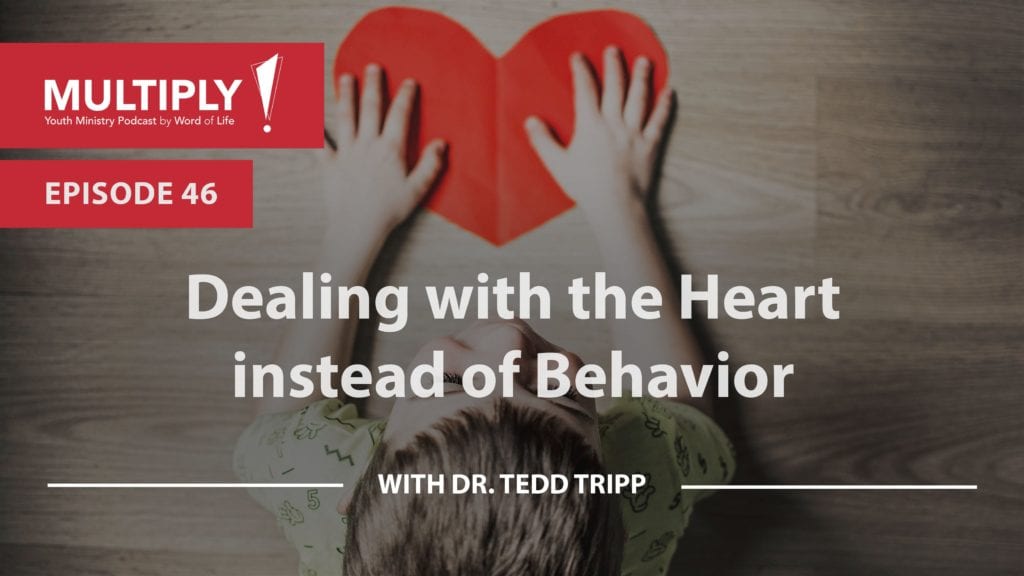The easiest thing to do is to deal with the things we can see. We can see behavior. We cannot see the heart. However, if we just deal with behavior (surface level) then we will create egotistic believers. Today on the podcast, Brian talks with Dr. Tedd Tripp with Shepherding the Heart Ministries about this and other heart issues related to students.
Not just addressing behavior and morals, but the heart.
Heart (Prov 4:23)– The core of our being, not just our feelings. The control center of a person, setting the course of life.
How to address the heart, not just morals:
Focus on teaching that is not just moralistic.
Sermon on the mount – Christ repeatedly focused on the heart issue behind the wrong behaviors addressed by God’s Law. For example, He said not just that murder was wrong, but also hatred. Not only did He say adultery was wrong, but also the desire to be with another woman. Christ’s focus, when teaching the Law of God, was not on the outward behaviors but the internal heart motives behind them.
How do we help parents/ministers address students regarding issues with new technologies and social media?
Don’t just take the phone away. We live in a connected culture and that will not address the heart. Instead, help parents find a way to address the behavior while also addressing the heart motives behind it (This is not only applicable to phone and social media usage). The heart motives behind phone and social media use are often self-centered. Open up this conversation with non-confrontational questions like “Help me understand why/how this is important to you.” Listen impartially without interrupting them. Be self-disclosing and share with them how you can relate to the same motives in your life playing out differently. Then come up with a plan together for you both to grow.
Heart attitudes:
Study heart attitudes as a family. The book, “Instructing a child’s Heart” has a list, including anger, hatred, the approval of others, covetousness, jealousy, and more. Study connected passages of the Bible and learn what God says about them. Discuss this with your students and ask how this could play out in their age group. Give each other illustrations. What is satisfying to us about these heart attitudes, and how are they against God’s plan for us? This gets them thinking.
The time to dive into heart issues is not when they have offended one. These discussions should not be used as a fix. Wait to address the issue until a time when you are no longer upset and the child is not on guard. Non-confrontationally share a new way of thinking by sharing a Biblical truth and then asking them to evaluate their behavior themselves. “Play the long game” when it comes to your students’ hearts.
Always take students to Scripture. Contrast heart attitudes with the attitudes that glorify God. Memorize positive verses that play on the negative heart attitudes. The Word of God is unique and sufficient. It is uniquely Inspired by God and equips us with all we need to know. “There is nothing that you have to talk to your youth group about, that is important for them to know, that you cannot tie to the word of God.” Sharing God’s word is not sharing what you think, but what God thinks. It remains objective when addressing heart issues uninfluenced by your opinion on the matter, and never returns void. God gave us His Word as a resource. Use it.
Outcome difference between those raised on a legalistic and moral training rather than discipleship focused on heart issues.
Night and Day: Those with legalistic moral training often become proud, self-righteous, and judgmental with no deep sense of their need for God. Those who learn to understand themselves and their inward struggles, or heart attitudes, have a sense of how profoundly they need God and His grace. They do not focus on making themselves look good externally but focus on what is going on inside. A kid who does the right things for the wrong reasons is just as bad as a kid acting out negatively. Especially in Christian education and church ministries, well-behaved children are more often rewarded and encouraged than those who truly understand the grace of God. Churches are trying to do the right thing, but often their focus is wrong.
Generation Z responds to depth, much more than a moralistic behavior correction. They engage well with genuine questions in a non-confrontational setting. Avoid inflammatory or confrontational wording. Instead, learn to ask good questions such as, “Help me understand…” Listen well, and then follow up with questions like, “Is this what you are saying?” Show you are listening and genuinely seek to understand.
Openly listen to your students, allowing yourself to seize the opportunities where you find you need to change. You will inevitably change as a leader, and the more open you are with your students, the more they will feel free to be honest with you. This is important.
Last Thought:
Try and help students navigate technology. Interact with them in constructive ways, helping them understand the inner motives drawing them to this technology. Ask them good questions about their technology use and help them to be self-critical about it. Lead them on a path of self-discovery.
Contact Tripp:
Website – shepherdingtheheart.org: blogcasts, itinerary, contact information, and store (books he has written, including “Shepherding a Child’s Heart,” and other things of value for parenting and shepherding kids).

